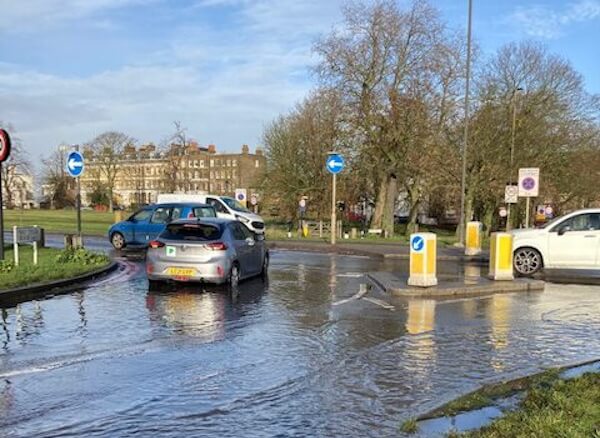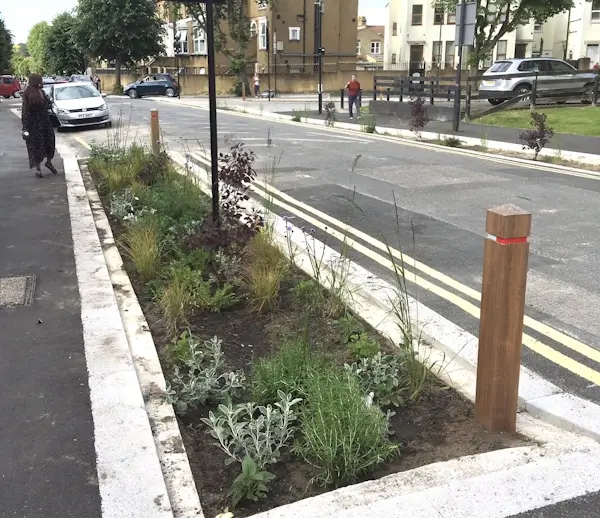Forum topic: Why London needs to be turned into a 'sponge city'
Why London needs to be turned into a 'sponge city'
19 Jun 2024 20:20 #7171- PGC Webmaster
Share
![]()
![]()
 Email
Email
The next four years are critical to tackling flooding and water pollution in London. To address these problems, London must urgently become a ‘Sponge City’. But how – and why? And how can Londoners with front or back gardens help? Alice Roberts from CPRE London explains.
 Climate change brings heavier rain and more flooding. Run-off from roads (oil, heavy metals, microplastics from tyres) then pollutes rivers (Photo: CPRE London)
Climate change brings heavier rain and more flooding. Run-off from roads (oil, heavy metals, microplastics from tyres) then pollutes rivers (Photo: CPRE London)
The problems
- Flooding. London used to be like a sponge, soaking up rainwater. But building and paving mean rainwater now runs into the drains – and they are failing to cope. See this BBC News report from 2021.
- Sewage pollution. Rainwater and sewage drains are combined in most of central/inner London. Unable to cope in heavy rainfall, they overflow into rivers, taking raw sewage with them. (Here’s a great summary from London Waterkeeper on sewage pollution.)
- Road run-off pollution. Rainwater from roads and parking lots picks up oil and heavy metals from vehicles, and microplastics from tyres and road markings. In much of London this enters ‘road drains’, flushing pollutants straight into rivers. (Here’s London Waterkeeper again on run-off pollution.)
A Sponge City manages these problems with greenery instead of relying solely on drains. ‘Rain gardens’ and wetlands capture, retain and absorb excess storm water, and filter it. (Bonus – they also support wildlife, make our streets more beautiful and help with urban cooling). Here’s Arup on sponginess and why it matters.
Cities as diverse as Shanghai, New York, Berlin and Cardiff are becoming sponge cities. Read about Cardiff.
Rain gardens are a super-effective way to create a sponge city: they stop water flowing into sewers and filter road run-off pollution. They are engineered to capture, hold on to and filter water from an area roughly ten times the size of the rain garden itself.
 In recent years Enfield Council has installed many new rain gardens like this newly planted example in Warwick Road, Bowes. However, Thames Water say London needs 357,000 rain gardens to stop sewers being overwhelmed
In recent years Enfield Council has installed many new rain gardens like this newly planted example in Warwick Road, Bowes. However, Thames Water say London needs 357,000 rain gardens to stop sewers being overwhelmed
London needs a massive drive to put in beautiful new rain gardens. Thames Water say we need a staggering 357,000 to ensure sewers aren’t overwhelmed. The new London Mayor must coordinate an emergency programme of rain garden construction. This video is a great summary.
And we need many more urban wetlands – which are of course also a massive boon for wildlife. Here’s Thames21 on what and why.
Front gardens also need to be reinstated, so water doesn’t run-off into the sewers, but is absorbed instead. Read more from London Waterkeeper.
Londoners – you can help by de-paving your front garden.
And Londoners can help by installing ‘SUDS planters’, to capture and hold rainwater from roofs, in their front and back gardens. Installing water butts will help too. Here’s Meristem Design explaining ‘SUDS planters’.
The next four years are critical to making London a resilient Sponge City – tackling flooding and water pollution. It’s a journey … this is just the start. Here’s a short video on how and why Berlin is also collecting rainwater for times of drought.
- Find out how a community in South London reduced flood risk in their area – the LWT Living with rainwater. A neighbourhood guide. The Lost Effra Project. London Wildlife Trust.
This article was originally published on the CPRE London website)
Make London a Sponge City meeting - 24th June
The call to make London a "sponge city" is backed by the More Natural Capital Coalition - a coalition of 20 charities working together across London to advance environmental goals in the capital.
You can find out more at 6pm on 24th June at a meeting at The Gallery in Cowcross Street, near Farringdon Station.
Please Log in or Create an account to join the conversation.
Why London needs to be turned into a 'sponge city'
20 Jun 2024 08:37 #7172- Neil Littman
Share
![]()
![]()
 Email
Email
Please Log in or Create an account to join the conversation.
Why London needs to be turned into a 'sponge city'
20 Jun 2024 09:05 #7173- Darren Edgar
Share
![]()
![]()
 Email
Email
Agreed re driveways. I've even reported some with pictures showing a garden then a solid driveway and the Council genuinely responded and said "we don't see the issue" despite the fact their very own cross-over guidance states planning permission required. Obviously highways still installed the drop....
Please Log in or Create an account to join the conversation.
Why London needs to be turned into a 'sponge city'
23 Jun 2024 11:38 #7179- Neil Littman
Share
![]()
![]()
 Email
Email
Please Log in or Create an account to join the conversation.
How to insert photos into a forum post
25 Jun 2024 15:11 - 25 Jun 2024 15:14 #7180- PGC Webmaster
Share
![]()
![]()
 Email
Email
I wanted to post a photo to show one of the blocked gulley covers in my road but there is no facility to post a photo on this site as far as I am aware.
It certainly is possible to upload photos, and many people have done so. But unfortunately the process isn't entirely obvious. In particular, some people omit the Insert step below.
At the bottom of the area for typing in your message there's a button marked Add Files
This will go to the file explorer on your computer or phone. Find the file you want and add it.
The photo will then show up under the draft message
Put your cursor at the point in the message where you want the picture and click on Insert
Please Log in or Create an account to join the conversation.
Why London needs to be turned into a 'sponge city'
25 Jun 2024 15:23 - 25 Jun 2024 15:28 #7181- Basil Clarke
Share
![]()
![]()
 Email
Email
I wanted to post a photo to show one of the blocked gulley covers in my road but there is no facility to post a photo on this site as far as I am aware. Am going to upload it to Enfield Matters FB page. Have also asked my local councillors to sort out.
However, this is a distraction from the main point, which is that over many decades both local authorities and private individuals have replaced absorbent surfaces like lawns and flower beds with hard non-absorbent surfaces. This is a much bigger problem than individual blocked gulleys and drains and it is down to government at all levels and all of us individually to do our bit to improve matters.
Obviously, there will be many people who can't afford to replace non-absorbent surfaces in their gardens, but there are also many better off people who can and should, and many of of them will have the biggest expanses of non-absorbent surface and are thus a more significant part of the problem.
Please Log in or Create an account to join the conversation.






